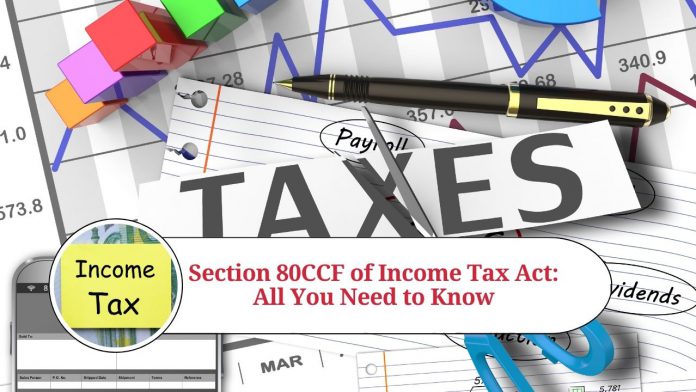Section 80CCF of the Income Tax Act: A Comprehensive Guide
Saving taxes is an important part of financial planning. Section 80CCF of the Income Tax Act is one such provision that can help taxpayers save tax. In this blog, we will discuss Section 80CCF in detail.
What is Section 80CCF?
Section 80CCF is a provision under the Income Tax Act, which allows taxpayers to claim deductions for investments made in specific instruments. These investments are made with the aim of encouraging savings and investment in infrastructure projects in the country.
Which investments are eligible for deduction under Section 80CCF?
The investments that are eligible for deduction under Section 80CCF are listed below:
- Infrastructure Bonds issued by government-owned companies such as NHAI, REC, HUDCO, etc.
- Infrastructure Bonds issued by private companies approved by the government.
The maximum amount of deduction that can be claimed under Section 80CCF is Rs. 20,000. This deduction is over and above the deductions available under Section 80C.
Who can claim deduction under Section 80CCF?
Any individual or Hindu Undivided Family (HUF) can claim a deduction under Section 80CCF for investments made in eligible infrastructure bonds.
How to claim deduction under Section 80CCF?
To claim a deduction under Section 80CCF, the taxpayer needs to follow the steps given below:
- Purchase infrastructure bonds from an eligible issuer.
- Submit the proof of investment along with the income tax return to claim the deduction.
- The deduction will be allowed in the year in which the investment is made.
Conclusion
Section 80CCF is a useful provision for taxpayers who want to save taxes by investing in infrastructure bonds. By investing in eligible instruments, taxpayers can claim deductions up to Rs. 20,000 over and above the deductions available under Section 80C. It is important to note that the investment must be made in eligible bonds and the proof of investment must be submitted to claim the deduction.
Other Related Blogs: Section 144B Income Tax Act
Frequently Asked Questions (FAQs)
Q. What is Section 80CCF of the Income Tax Act? A. Section 80CCF is a provision under the Income Tax Act that allows taxpayers to claim deductions for investments made in infrastructure bonds issued by government-owned or approved private companies.
Q. Who can claim a deduction under Section 80CCF? A. Any individual or Hindu Undivided Family (HUF) can claim a deduction under Section 80CCF for investments made in eligible infrastructure bonds.
Q. What is the maximum amount of deduction that can be claimed under Section 80CCF? A. The maximum amount of deduction that can be claimed under Section 80CCF is Rs. 20,000.
Q. What are the eligible investments under Section 80CCF? A. The eligible investments under Section 80CCF are infrastructure bonds issued by government-owned companies such as NHAI, REC, HUDCO, etc., and infrastructure bonds issued by private companies approved by the government.
Q. Is the deduction under Section 80CCF over and above the deduction available under Section 80C? A. Yes, the deduction under Section 80CCF is over and above the deduction available under Section 80C.
Q. How can a taxpayer claim a deduction under Section 80CCF? A. To claim a deduction under Section 80CCF, the taxpayer needs to purchase eligible infrastructure bonds and submit proof of investment along with the income tax return.
Q. Can a taxpayer claim a deduction under Section 80CCF for investments made in previous years? A. No, a deduction under Section 80CCF can only be claimed in the year in which the investment is made.
Q. Can a taxpayer claim a deduction under Section 80CCF for investments made in infrastructure bonds issued by foreign companies? A. No, a deduction under Section 80CCF can only be claimed for investments made in infrastructure bonds issued by government-owned or approved private companies in India.




















